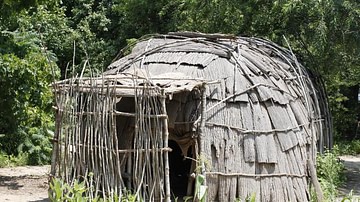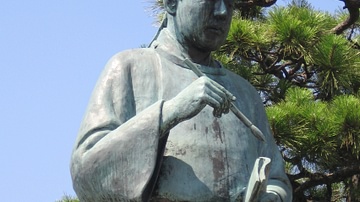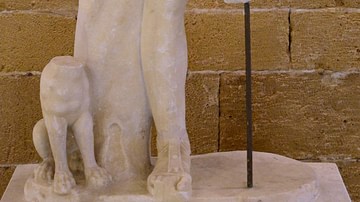Search
Did you mean: Vishnu?
Search Results

Definition
King George's War - When New England Colonists Captured A Powerful French Fort
King George's War (1744-1748) was the third great colonial conflict fought in North America between Great Britain and France, each side aided by their respective Native American allies. Like the previous two major colonial wars, it coincided...

Definition
Thera
Thera is the ancient name for both the island of Santorini in the Greek Cyclades and the name of the volcano which famously erupted on the island in the middle Bronze Age. The 17th century BCE eruption covered Akrotiri, the most important...

Definition
Wampanoag Confederacy
The Wampanoag Confederacy was a coalition of over 30 Algonquian-speaking Native American tribes who lived in the region of modern-day New England, specifically from Rhode Island down through Massachusetts and parts of Connecticut. They are...

Definition
Portuguese Nagasaki
Nagasaki, on the northwest coast of Japan’s Kyushu Island, was an important Portuguese trading base from c. 1571 to 1639, and the most eastern outpost of the Portuguese empire. The Portuguese presence transformed Nagasaki from a small fishing...

Definition
Edward Low
Edward 'Ned' Low was an English pirate active in the Caribbean and eastern Atlantic from 1721 to 1724 during the Golden Age of Piracy (1690-1730). Probably the most sadistic and cruelest of all pirate captains, Low was said to have frequently...

Definition
Manyoshu
The Manyoshu or 'Collection of Ten Thousand Leaves' is an anthology of ancient Japanese poems compiled c. 759 CE during the Nara Period but including many earlier works. The most likely person to have assembled the collection is Otomo no...

Definition
Britomartis
Britomartis, also known as Diktynna (Dictynna), was the Cretan goddess of hunting and fishing nets in Greek mythology. Although referred to as a nymph and worshipped locally, she had at least two significant and active shrines, one in Crete...

Article
Ancient Egyptian Agriculture
Agriculture was the foundation of the ancient Egyptian economy and vital to the lives of the people of the land. Agricultural practices began in the Delta Region of northern Egypt and the fertile basin known as the Faiyum in the Predynastic...

Article
Viking Age Greenland
Greenland was drawn into the Viking Age and settled by Norse Vikings in the late 980s CE, their presence there lasting into the 15th century CE. Despite its ice-riddled geography, the Norse managed to carve out a living for themselves in...

Article
Athletics, Leisure, and Entertainment in Ancient Rome
Although much of ancient Roman life revolved around negotium (work and business), there was also time available for otium (leisure). Ranging from swimming to playing board games to attending theatre performances, athletics and forms of entertainment...